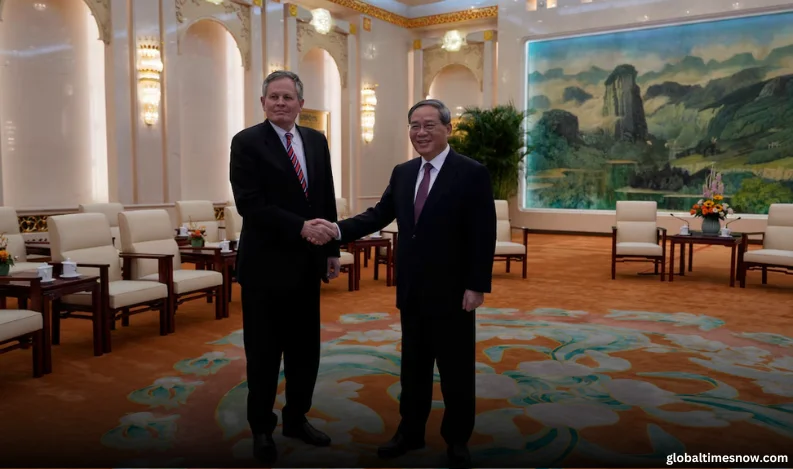Beijing – U.S. Republican Senator Steve Daines met with Chinese Premier Li Qiang in Beijing on Sunday, accompanied by a delegation of seven top American executives. The meeting took place at the Great Hall of the People following an annual business summit attended by global industry leaders. Among the executives joining Daines were Qualcomm CEO Cristiano Amon, Pfizer CEO Albert Bourla, Cargill CEO Brian Sikes, and Boeing Global Senior Vice President Brendan Nelson. The delegation underscored the ongoing business ties between the two nations despite ongoing trade tensions.
First U.S. Political Visit Under Trump Administration
Daines' visit marks the first time a U.S. politician has traveled to China since President Donald Trump assumed office in January. The trip signals Beijing's interest in re-establishing high-level communication with Washington as it seeks to ease trade restrictions and attract foreign investment amid a slowing domestic economy.
A long-time supporter of Trump and a key member of the Senate Foreign Relations Committee, Daines played a significant role in previous U.S.-China trade negotiations. He has visited China multiple times in his capacity as senator and has professional experience in the country, having lived in Guangzhou and Hong Kong during the 1990s while working for Procter & Gamble.
Speaking at the meeting, Daines highlighted the extensive history of American businesses operating in China. “Collectively, these seven companies have over 275 years of experience doing business in China,” he stated, emphasizing their contributions to economic growth.
Trade Relations and Tariff Concerns
China has been actively engaging foreign investors to counterbalance the impact of U.S. tariffs. Premier Li’s meeting with the American delegation was particularly significant, as he opted not to hold separate discussions with other foreign CEOs attending the China Development Forum for the second consecutive year.
The visit comes at a critical time, with U.S.-China relations strained by new trade measures imposed by the Trump administration. The White House has accused Beijing of failing to curb the flow of fentanyl into the U.S., prompting additional tariffs on Chinese imports.
Looking ahead, the Biden administration’s review of China’s compliance with the “phase one” trade agreement—initially established during Trump’s first term—is set to conclude on April 1. Further tariffs on nations taxing U.S. imports, potentially including China, are expected in early April.
During the meeting, Premier Li called for a diplomatic approach to bilateral relations. “Currently, U.S.-China relations have reached an important juncture,” he said. “Our two sides need to choose dialogue over confrontation, win-win cooperation over zero-sum competition.”
High-Level Talks on Trade and Fentanyl Control
The discussions in Beijing also involved senior Chinese officials, including Commerce Minister Wang Wentao, Executive Vice Foreign Minister Ma Zhaoxu, and Zheng Shanjie, director of China’s state planning body. Anny Vu, the newly appointed chargé d’affaires at the U.S. Embassy in China, was also present.
A day before the meeting with Li, Daines held talks with Chinese Vice Premier He Lifeng, where he pressed Beijing to curb the export of fentanyl precursors. In a social media post following the meeting, Daines expressed hope that further high-level discussions between the U.S. and China would take place soon.
As trade tensions persist, the outcomes of these discussions will likely shape the trajectory of U.S.-China economic relations in the coming months.























